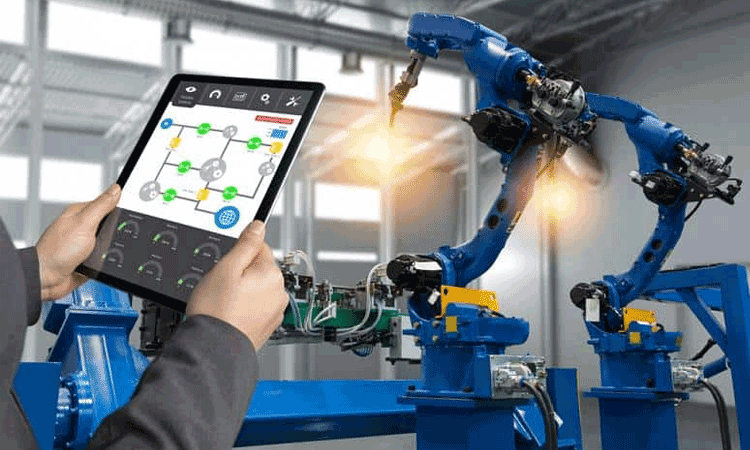Artificial intelligence (AI) is indeed making a positive impact on the manufacturing industry. With its ability to process and analyze vast amounts of data quickly, AI is revolutionizing various aspects of manufacturing, leading to increased efficiency, productivity, and cost savings.
Here are some ways AI is benefiting the manufacturing sector:
Predictive Maintenance:
AI algorithms can analyze sensor data and machine performance metrics to predict when equipment is likely to fail. By implementing predictive maintenance strategies, manufacturers can schedule maintenance tasks proactively, minimizing unplanned downtime, and reducing maintenance costs.
Quality Control:
AI-powered systems can analyze visual data from cameras and sensors to detect defects or anomalies in real-time during the manufacturing process. By automating quality control, manufacturers can identify and address issues early, reducing waste, improving product quality, and lowering the chances of faulty products reaching customers.
Process Optimization:
AI algorithms can optimize manufacturing processes by analyzing data from various sources, including supply chain data, production line data, and historical performance. By identifying patterns, inefficiencies, and bottlenecks, AI can suggest process improvements to enhance overall efficiency, reduce cycle times, and optimize resource allocation.
Supply Chain Management:
AI can help optimize supply chain operations by analyzing data related to demand, inventory levels, and logistics. By accurately forecasting demand, AI can improve inventory management, reducing inventory holding costs and minimizing stockouts. AI can also optimize routing and scheduling decisions, improving logistics efficiency.
Intelligent Robotics:
AI-powered robots and cobots (collaborative robots) are increasingly being used in manufacturing processes. These robots can perform repetitive and labor-intensive tasks with precision and speed, enhancing productivity and reducing the risk of human error. Cobots can work alongside human workers, enhancing safety and allowing humans to focus on more complex tasks.
Energy Efficiency:
AI algorithms can monitor energy usage in manufacturing facilities and identify opportunities for optimization. By analyzing energy consumption patterns and equipment performance, AI can suggest energy-saving measures, such as adjusting machine settings or optimizing production schedules, leading to reduced energy costs and environmental impact.
Product Design and Innovation:
AI can assist in product design and innovation by analyzing vast amounts of data, including customer feedback, market trends, and historical performance. By identifying patterns and insights, AI can aid in the development of new products, optimize designs, and suggest improvements based on customer preferences and market demands.
Adoption of AI in manufacturing Industry
The adoption of AI in manufacturing is rapidly increasing, and many manufacturing companies across various industries have implemented AI technologies in their operations. It’s challenging to provide an exact number, as the extent of AI adoption may vary among companies and industries. However, here are some statistics and insights that showcase the growing trend of AI adoption in the manufacturing sector:
- According to a survey conducted by the Boston Consulting Group (BCG), around 85% of manufacturing companies believe that AI will play a significant role in their operations within the next five years.
- A study by PwC estimates that AI could contribute up to $15.7 trillion to the global economy by 2030, with manufacturing being one of the industries that benefits the most.
- The International Data Corporation (IDC) predicts that worldwide spending on AI systems will reach $97.9 billion in 2023, with the manufacturing industry being one of the largest investors in AI technologies.
- Leading manufacturing companies across various sectors, including automotive, electronics, consumer goods, and pharmaceuticals, have been actively adopting AI. Companies like General Electric, Siemens, Samsung, Bosch, ABB, and many others have invested significantly in AI technologies for their manufacturing processes.
- AI is utilized in manufacturing for various applications, such as predictive maintenance, quality control, process optimization, supply chain management, robotics and automation, and demand forecasting.
- The integration of AI technologies in manufacturing helps companies improve efficiency, reduce costs, enhance product quality, optimize supply chain operations, and enable faster decision-making.
While it’s challenging to provide an exact count of how many manufacturing companies use AI, the widespread adoption and investment in AI technologies in the manufacturing sector indicate that numerous companies are actively leveraging AI to gain a competitive edge and drive innovation in their respective industries.
Overall, AI is playing a significant role in transforming manufacturing processes, enabling companies to operate more efficiently, produce higher-quality products, reduce costs, and make data-driven decisions. As AI technology continues to advance, we can expect even greater benefits and advancements in the manufacturing industry.





